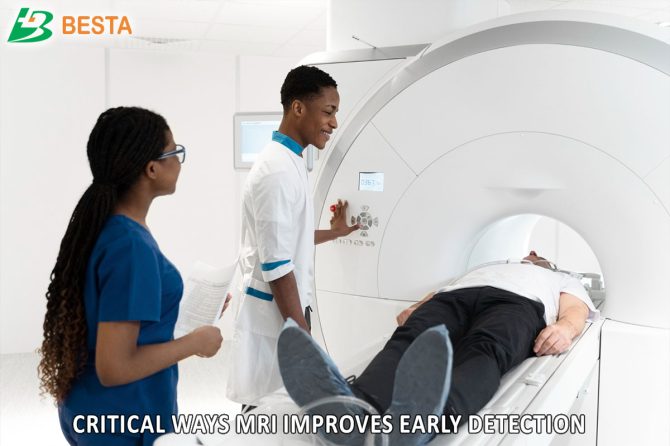
Diagnostic Imaging: 7 Critical Ways MRI Improves Early Detection
Diagnostic Imaging: 7 Critical Ways MRI Improves Early Detection
Introduction
When it comes to diagnostic imaging, few tools are as powerful and precise as Magnetic Resonance Imaging (MRI). If you’ve ever wondered why doctors rely on MRI scans so often, the answer lies in their ability to detect diseases—especially serious conditions like cancer—at the earliest possible stage. And early detection often means better outcomes, simpler treatments, and higher survival rates.
At Besta Super Specialized Polyclinic, the first specialized cancer center in the region, MRI technology plays a vital role in providing accurate, timely diagnoses. Combined with their advanced radiotherapy, chemotherapy, ultrasound, CT-Scan, and digital X-ray services, Besta ensures patients receive comprehensive care from start to finish.
In this article, we’ll explore seven critical ways MRI technology boosts early detection, why it’s a game-changer for your health, and how Besta’s diagnostic imaging services make it accessible and effective.
1. Unmatched Soft Tissue Clarity
MRI is unmatched when it comes to capturing detailed images of soft tissues—organs, muscles, ligaments, and even the brain. Unlike X-rays, which are better suited for bones, MRI offers unparalleled clarity for detecting subtle abnormalities.
For example, small tumors in the brain or spinal cord that might be invisible on other scans can often be spotted early with an MRI. This clarity allows doctors at Besta to catch diseases before they progress, leading to faster intervention.
2. Detecting Cancer at an Early Stage
One of MRI’s biggest strengths is its ability to detect cancer in its earliest stages. For certain cancers—like brain tumors, breast cancer, and prostate cancer—MRI can reveal abnormal growths long before they cause noticeable symptoms.
At Besta, these MRI findings are seamlessly integrated with other diagnostic services like CT-Scans and biopsies to confirm results. This multi-layered approach helps ensure accuracy, which is crucial in planning effective cancer treatment.
3. Identifying Neurological Disorders
Your brain and nervous system are delicate, and early detection of neurological issues can make all the difference. MRI is particularly useful for spotting conditions like multiple sclerosis, stroke damage, and aneurysms.
Besta’s neurology specialists use MRI imaging to create personalized treatment plans, working closely with other departments to address any related cancer risks or overlapping symptoms.
4. Tracking Disease Progression
Sometimes, detecting a disease is only the first step. Monitoring its progression is just as important. MRI scans allow doctors to see changes in tumors, lesions, or other abnormalities over time.
This means patients at Besta can receive ongoing care that’s adjusted based on the most recent imaging results—helping treatments stay on track and increasing the likelihood of a positive outcome.
5. Radiation-Free Imaging
Unlike CT scans or X-rays, MRI uses magnetic fields and radio waves instead of ionizing radiation. This makes it a safer choice for patients who require multiple scans over time.
Besta’s MRI services are especially valuable for children, pregnant women (in certain cases), and patients with chronic conditions who need repeated imaging without increasing radiation exposure risk.
6. Detecting Hidden Internal Injuries
Sometimes injuries aren’t visible on the outside, and even advanced imaging like X-rays might miss them. MRI can detect hidden internal injuries—like ligament tears, organ damage, or internal bleeding—that could otherwise go untreated.
For cancer patients, MRI also helps identify secondary complications from treatment, such as tissue damage from radiation therapy, ensuring these are managed before they worsen.
7. Supporting Comprehensive Cancer Care
At Besta Super Specialized Polyclinic, MRI is not just a standalone service—it’s part of a larger, integrated care system. Whether it’s guiding a biopsy, planning a surgery, or evaluating the success of radiotherapy and chemotherapy, MRI plays a role in nearly every step of the cancer care journey.
With access to other high-tech diagnostic tools like ultrasound, CT-Scan, and digital X-ray, patients receive complete, coordinated care that leaves no stone unturned.
Conclusion
Diagnostic imaging—especially MRI—has revolutionized how we detect, monitor, and treat diseases. Early detection means you get a head start on treatment, and with the right care team, that can make all the difference.
At Besta Super Specialized Polyclinic, MRI is just one part of their world-class healthcare services designed to save lives through precision and compassion. If you or a loved one needs accurate, reliable diagnostic imaging, Besta’s team is ready to help you take control of your health today.
FAQs
1. How long does an MRI scan take?
Most MRI scans take between 30 minutes to an hour, depending on the area being examined.
2. Is MRI safe for everyone?
MRI is generally safe, but patients with certain implants or metal in their bodies should consult their doctor first.
3. How should I prepare for an MRI at Besta?
You’ll be advised to remove all metal objects and may need to fast if contrast dye will be used.
4. Can MRI detect all types of cancer?
MRI is highly effective for certain cancers but is usually combined with other tests for a complete diagnosis.
5. Does Besta offer same-day MRI results?
In many cases, yes. Besta’s diagnostic team works quickly to deliver results, often within 24 hours.

Most Commented